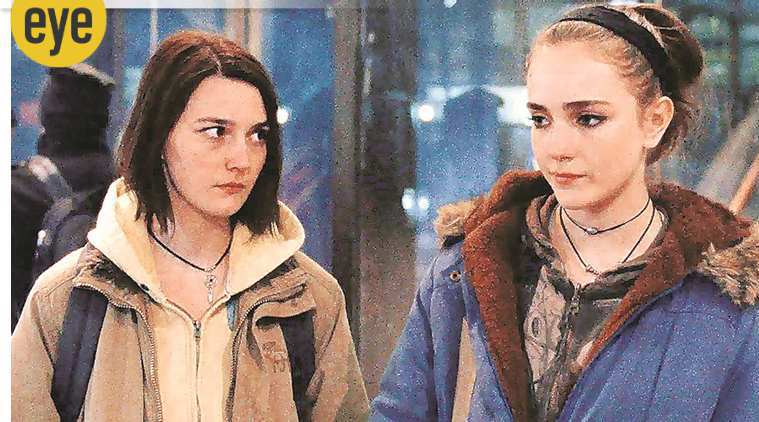 Alone, together. (Still from the film)
Alone, together. (Still from the film)
Having a problem that you have to deal with all by yourself can be hard. If you have someone with you, it can get better, but it still remains your problem. Eliza Hittman’s Never Rarely Sometimes Always (on several streaming platforms) uses an unwanted teenage pregnancy to tell a bigger story. Of being female, in a man’s world. Of having to struggle to be heard. You see 17-year-old Autumn hit herself on her belly, repeatedly. Of course, that doesn’t help. What she needs is is an abortion, which she cannot get where she lives, in a small town in Pennsylvania.
Autumn’s journey, on the bus to New York, accompanied by her cousin Skylar, isn’t only about escaping to a place where she can get help. It’s also about escaping from a place where she couldn’t ask for help: clearly, she hasn’t been able to turn to anyone at home, where lives a menacing stepfather. We are never told why, but we do see the depths of her loneliness.
There’s nothing expository in Hittman’s treatment of a subject which can so easily turn either manipulative or maudlin, or both. Autumn speaks very little. Her face is her canvas and we see a multitude in her eyes: being hurt, helpless and frustrated. The bond between the two girls is strong and withstands bursts of temper and name-calling: it is also the bulwark between them and the sole significant male in the movie, a young man their age who extends support, which is, yes, transactional.
First-timer Sidney Flanigan is so believable as Autumn, that you never stop feeling protective of her, even when she is having a meltdown and lashing out at her only real friend, the cousin. Talia Ryder as Skylar, and Théodore Pellerin as Jasper are equally real: the two girls mill around the Manhattan Port Authority Bus Terminal, wheeling a strolley between them, getting a measure of the boy, as they wait through the night for Autumn’s appointment at the facility.
The most devastating part of the film is also the quietest. An empathetic, experienced staffer taking Autumn’s details, which includes her sexual history, requests that she answer with just the one word, choosing between “never rarely sometimes always”. A pause after one telling question is revelatory: Autumn has been the victim of abuse. Is it from her partner/s? Or, someone in the family?
We don’t know. All we know is that the pain is for real. Just like Cristian Mungiu’s 2007 Cannes-winner 4 Months, 3 Weeks and 2 Days, in which a college friend helps another get an abortion (illegal in Romania in the 1980s, when the movie is set), which this film will remind you of, there is no time for sentimentality. Only time to get this done, here and now.
I saw this sombre yet bracing film at the International Film Festival of Berlin in mid-February earlier this year, where it won a jury award, and every once in a while Autumn’s face flashes in front of me: will she get past this? I cross my fingers.